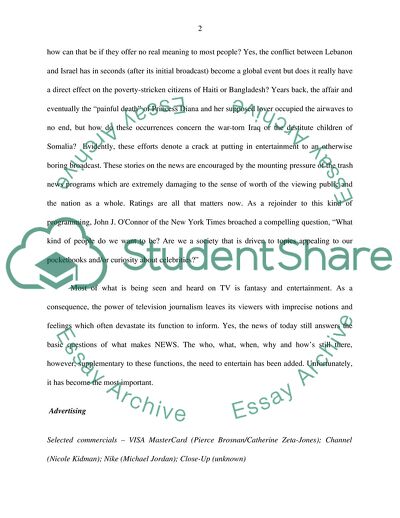
- Home
- Free Samples
- Premium Essays
- Editing Services
- Extra Tools
- Essay Writing Help
- About Us
- Studentshare
- Subjects
- Miscellaneous
- News analysis and Advertising
News analysis and Advertising - Essay Example

- Subject: Miscellaneous
- Type: Essay
- Level: Masters
- Pages: 4 (1000 words)
- Downloads: 0
- Author: abbeybogisich
Extract of sample "News analysis and Advertising"
Unmistakably, present day television is the most powerful means of public communications and exceedingly affects everyone in human society. Nonetheless, the most significant question to be asked is: what brand of truth and in what form and hue does today’s television news tell? Obviously, 20th century news on television either blow up and amplify or curb and restrict what is being presented on the air. Most often, it leaves out too much of what should have been dished out. Many of the subject matters on TV news today are worthless to the viewer simply because they focus on incidents that affect only a small sector of the audience (e.g. police-blotter accidents or petty crimes.) Are these events really so important to most people?
Most probably they’re not. However, they get so much attention and focus and are allotted so much air time. But how can that be if they offer no real meaning to most people? Yes, the conflict between Lebanon and Israel has in seconds (after its initial broadcast) become a global event but does it really have a direct effect on the poverty-stricken citizens of Haiti or Bangladesh? Years back, the affair and eventually the “painful death” of Princess Diana and her supposed lover occupied the airwaves to no end, but how do these occurrences concern the war-torn Iraq or the destitute children of Somalia?
Evidently, these efforts denote a crack at putting in entertainment to an otherwise boring broadcast. These stories on the news are encouraged by the mounting pressure of the trash news programs which are extremely damaging to the sense of worth of the viewing public and the nation as a whole. Ratings are all that matters now. As a rejoinder to this kind of programming, John J. OConnor of the New York Times broached a compelling question, “What kind of people do we want to be? Are we a society that is driven to topics appealing to our pocketbooks and/or curiosity about celebrities?
” Most of what is being seen and heard on TV
...Download file to see next pages Read MoreCHECK THESE SAMPLES OF News analysis and Advertising
Market Performance of Scholz & Friends Advertising Agency
The Strategy that The Chronicle Gazette Must Implement to Further Penetrate and Maintain Its Market
The Future of Nigerian Advertising Industry
Cosmetic Industry Advertising Analysis- Prime focus on L'Oreal
Analyzing a Marketing News Story
Integrated Marketing Communications, Societal Effects of Advertising, and Supportive Communication Elements
Theory to Practice Analysis in the Advertising Industry
Advertising Strategy of Pepsi and Doritos

- TERMS & CONDITIONS
- PRIVACY POLICY
- COOKIES POLICY